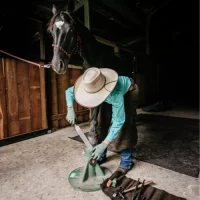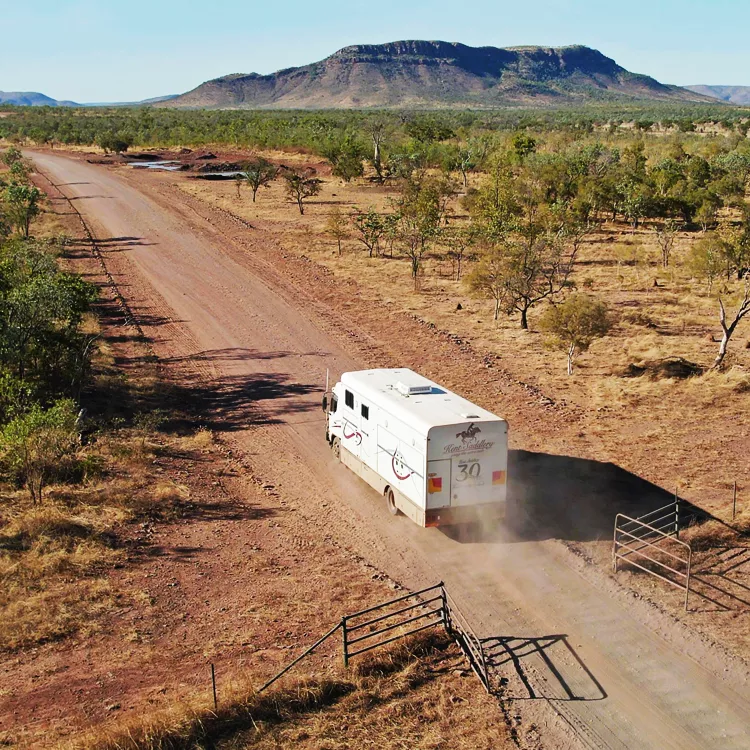Les Capewell – Cunnamulla, Western QLD

“It’s been a beautiful life”
On the evening of 20th August 2013, Lyle and Helen were on the home run from their outback “trip” and stopped for the evening meal at the Club Boutique Hotel Cunnamulla. A distinctive looking gentleman was sitting at the bar, his snowy white beard contrasting dramatically with a black felt hat. He was drinking black coffee and was not backward in coming forward. His name was Les Capewell, a Cunnamulla fella. Early next morning, Les and the Hotel proprietor Peieta Mills were due to set off for Camooweal for the Drover’s Festival and Les was ready.
Les was born in St George, Qld. and at six to eight weeks old was on the road, tucked up in a butter box under the sulky seat as his parents took a mob of sheep from Tarama Downs to St George. When they pulled up, a horse collar was put down in the shade “That was my crib.”
Les’s childhood was spent mainly away from towns; his Dad, a drover/truck driver moved from place to place. Les missed a lot of school…”couldn’t catch up and I couldn’t pronounce me “h’s.” The teacher would make me repeat in front of the class, “Henry Hagan with the hard, hard head.” The kids’d throw off at me, I’d throw punches, then I’d get the cuts. Once I was blamed for knocking a boy down the steps. I didn’t; he fell, but the teacher gave me the cane and then he asked me, “Leslie, why don’t you pull your hand away when you get the cane, like the others?” I said, “You don’t hurt me half as much as my mother.” He pauses, “She flogged me pretty bad.”
The eleven year old informed that teacher, “That’s the last cuts you’re giving me,” collected his slate and pencil and shifted with his parents to Wyandra. “I did lots of work around cattle sale yards earning a few bob here and there and at shearing sheds rouseabouting with an uncle; crutching, sweeping up and responding to “Tarboy!” That was OK until his uncle thought Les should be tarred and feathered. Escaping that humiliation, the lad shifted in with his grandfather. It was a good relationship and at thirteen, Les announced “I’m gonna get a job!” My grandfather laughed…he seldom laughed.” “The young would-be drover insisted. “If I get a mob of sheep or cattle, Grandfather, will you come cooking for me? My grandfather replied, “I most certainly will, my boy.” He always called me “my boy.”
In 1946-47 drovers were scarce. Les headed to Primac and told the manager outright, “I’m looking to get a mob of sheep or cattle to go droving with, Mr Backhouse.” The stunned manager told Les to wait while he spoke with a Mr Bill Webster. Les overheard Mr Backhouse laugh and comment “Look at the size of him,” and shortly after Mr Webster came to speak to the boy. “So you’re George Capewell’s son hey, and I hear you’re looking for a mob of sheep or cattle?” “Yes, Mr Webster I am,” Les replied. With a determination that contradicted his size and the assurance that his grandfather would be involved in the drove, the whip of a lad convinced Mr Webster, who responded, “Be at Mitchell Plains to take delivery of fifteen hundred shorn weaner wethers for Meatavale. Take your time with them and you’ve got yourself a job, my boy”
Les was happy. “Grandfather had a sulky, three horses and two dogs” and a beneficial two year working relationship between the teenager and his grandfather followed. Sadly, the older bushman was then diagnosed with cancer.
Good memories remain, and counting sheep is a necessary skill for any sheep handler. It’s not an easy task when they’re rushing through an open gate. “When my grandfather asked me, “You happy with the count, my boy?” I knew he was testing me out. “What do you mean, happy?” I asked and he said “I’ll learn you how to count sheep one day.” So one day we were playing cards and Grandfather took the Kings, Jacks and Queens out of the pack and began putting the other cards down, face up and counting the numbers on each card over and over quickly.” Les repeats his Grandfather’s words, “That’s how you learn to count sheep. In a mob of six thousand, if they broke, I could spot thirty at a time…run my eyes over them and have it.” He grins in his beard, “but I still can’t spell.”
Spelling didn’t count when Les met Nancy Gambell, a drover’s daughter. With no encouragement from their parents, they decided “it’s now or never” and were married on Saturday, March 28, 1958. Next day they took charge of a mob of sheep from Woodstock Station. Some of the droving team pulled out on them and Les taught Nancy how to drive a wagon, cook damper, “…had to teach her quite a bit really.” They were married forty-nine years and their seven children experienced a droving lifestyle, attended school at Cunnamulla and Bollon and were, Les says proudly “as good workers as any man.” Nancy passed away in 2007 and Les reflects, “All I ever mainly did was drove sheep… Nancy didn’t like cattle.”
Their droving trips covered Western Q’ld and into New South Wales as far as Young, Orange, Hay, Forbes and Deniliquin. “…beautiful droving down there,” Les enthuses, “…big open lanes.” Les had “beautiful sheep dogs who did everything but talk…still got one up home” and he’s satisfied. “It’s been a beautiful life; had its ups and downs.” Bottle collecting, fighting bush fires, rodeo riding, jockeying “…had to ride all the mongrels” and boxing “…learned to box early.” Les chuckles,…“remember Sharman’s boxing tents, five bob a round?”
At the Club Boutique Hotel Cunnamulla there were more stories to tell. Les hadn’t drunk his coffee…probably a good thing. It was past closing time and we realized that, as we arrived home in Stanthorpe, Les would be in Camooweal, meeting up with droving mates from all over the country and more reminiscing would have begun.
Image caption:
1) Les with one of the many trophies he won for flat racing at Bush Gymkanas















